Unit 9 What is happiness课文翻译综合教程二
Unit 9 What Is Happiness Words and Expressions综合教程二
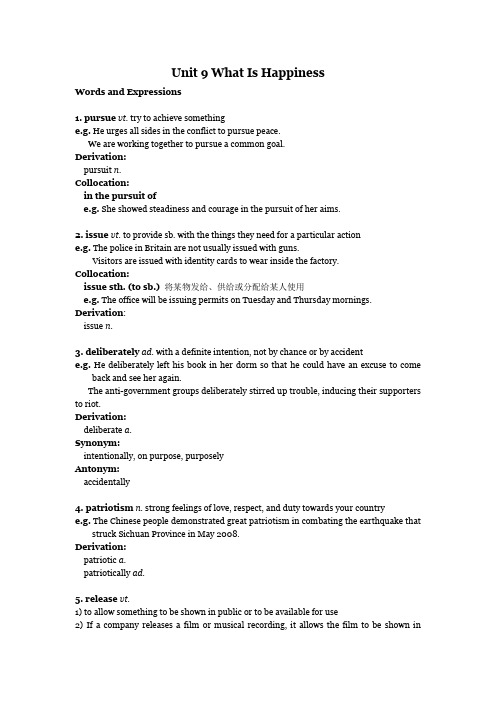
Unit 9 What Is HappinessWords and Expressions1. pursue vt. try to achieve somethinge.g. He urges all sides in the conflict to pursue peace.We are working together to pursue a common goal.Derivation:pursuit n.Collocation:in the pursuit ofe.g. She showed steadiness and courage in the pursuit of her aims.2. issue vt. to provide sb. with the things they need for a particular actione.g. The police in Britain are not usually issued with guns.Visitors are issued with identity cards to wear inside the factory.Collocation:issue sth. (to sb.) 将某物发给、供给或分配给某人使用e.g. The office will be issuing permits on Tuesday and Thursday mornings. Derivation:issue n.3. deliberately ad. with a definite intention, not by chance or by accidente.g. He deliberately left his book in her dorm so that he could have an excuse to comeback and see her again.The anti-government groups deliberately stirred up trouble, inducing their supporters to riot.Derivation:deliberate a.Synonym:intentionally, on purpose, purposelyAntonym:accidentally4. patriotism n. strong feelings of love, respect, and duty towards your countrye.g. The Chinese people demonstrated great patriotism in combating the earthquake thatstruck Sichuan Province in May 2008.Derivation:patriotic a.patriotically ad.5. release vt.1) to allow something to be shown in public or to be available for use2) If a company releases a film or musical recording, it allows the film to be shown incinemas, or makes the musical recording available for the public to buye.g. We have to release the news before 5 o’clock tomorrow morning.Paul McCartney’s new album will be released at the end of the month.Derivation:release n.e.g.Her latest release is a rock ‘n’ roll version of My Way.Collocation:be on / in general releasepress release(政府机构、政党等发布的)新闻稿6. therapy n. a form of treatment for an illness or medical conditione.g. The therapy involves getting the patients to tell the doctor about their early childhood.Nowadays, occupational therapy is accepted by more and more people. Synonym:treatmentCollocation:undergo therapy7. flawless a. without any mistakes, marks or bad featuree.g. The baby was plump, his skin flawless and his eyes bright blue.The flawless launch was watched by millions of people on television.Derivation:flawlessly ad.flaw n.Synonym:perfectAntonym:imperfect8.exhale vt. / vi.breathe air out through your mouth or nosee.g. Hold your breath for five seconds and then exhale slowly.He exhaled smoke hurriedly to continue his urgent work.Antonym:inhaleDerivation:exhalation n.9. display vt. to give a clear demonstration of (a quality, emotion, or skill)e.g. The new market displayed a great many goods for sale.Derivation:display n.Synonym:present, demonstrate10. perpetual a. continuing all the timee.g. Her husband’s perpetual jealousy made her feel anxious.He soon grew tired of her perpetual demands for money.Derivation:perpetually ad.e.g. She perpetually wore a worried look on her face.Synonym:permanent, eternal11. run out of not having any more of ite.g. I hope we see a gas station soon —we’re running out of fuel.In the end she ran out of patience and started hitting him.We air-freighted the shipment because our agent had run out of stock. 我们空运了这批货物,是因为我们的代理商已用完库存了。
新标准大学英语综合教程2 Unit 9课文翻译
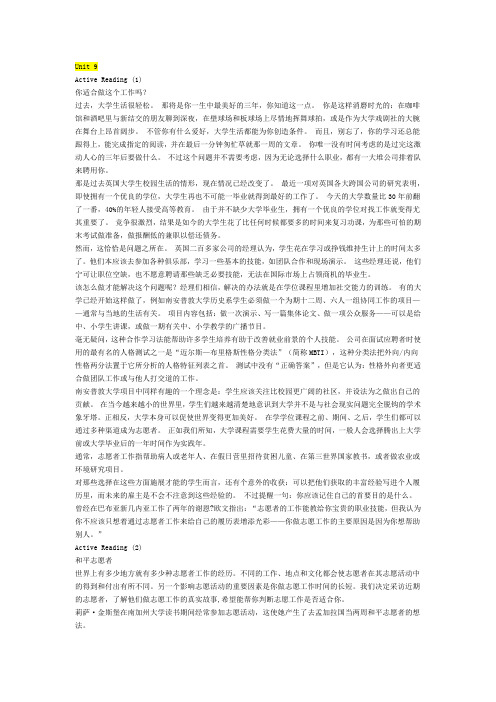
Unit 9Active Reading (1)你适合做这个工作吗?过去,大学生活很轻松。
那将是你一生中最美好的三年,你知道这一点。
你是这样消磨时光的:在咖啡馆和酒吧里与新结交的朋友聊到深夜,在壁球场和板球场上尽情地挥舞球拍,或是作为大学戏剧社的大腕在舞台上昂首阔步。
不管你有什么爱好,大学生活都能为你创造条件。
而且,别忘了,你的学习还总能跟得上,能完成指定的阅读,并在最后一分钟匆忙草就那一周的文章。
你唯一没有时间考虑的是过完这激动人心的三年后要做什么。
不过这个问题并不需要考虑,因为无论选择什么职业,都有一大堆公司排着队来聘用你。
那是过去英国大学生校园生活的情形,现在情况已经改变了。
最近一项对英国各大跨国公司的研究表明,即使拥有一个优良的学位,大学生再也不可能一毕业就得到最好的工作了。
今天的大学数量比30年前翻了一番,40%的年轻人接受高等教育。
由于并不缺少大学毕业生,拥有一个优良的学位对找工作就变得尤其重要了。
竞争很激烈,结果是如今的大学生花了比任何时候都要多的时间来复习功课,为那些可怕的期末考试做准备,做报酬低的兼职以偿还债务。
然而,这恰恰是问题之所在。
英国二百多家公司的经理认为,学生花在学习或挣钱维持生计上的时间太多了。
他们本应该去参加各种俱乐部,学习一些基本的技能,如团队合作和现场演示。
这些经理还说,他们宁可让职位空缺,也不愿意聘请那些缺乏必要技能,无法在国际市场上占领商机的毕业生。
该怎么做才能解决这个问题呢?经理们相信,解决的办法就是在学位课程里增加社交能力的训练。
有的大学已经开始这样做了,例如南安普敦大学历史系学生必须做一个为期十二周、六人一组协同工作的项目——通常与当地的生活有关。
项目内容包括:做一次演示、写一篇集体论文、做一项公众服务——可以是给中、小学生讲课,或做一期有关中、小学教学的广播节目。
毫无疑问,这种合作学习法能帮助许多学生培养有助于改善就业前景的个人技能。
公司在面试应聘者时使用的最有名的人格测试之一是“迈尔斯—布里格斯性格分类法”(简称MBTI),这种分类法把外向/内向性格两分法置于它所分析的人格特征列表之首。
(完整版)Unit-9-What-is-happiness课文翻译
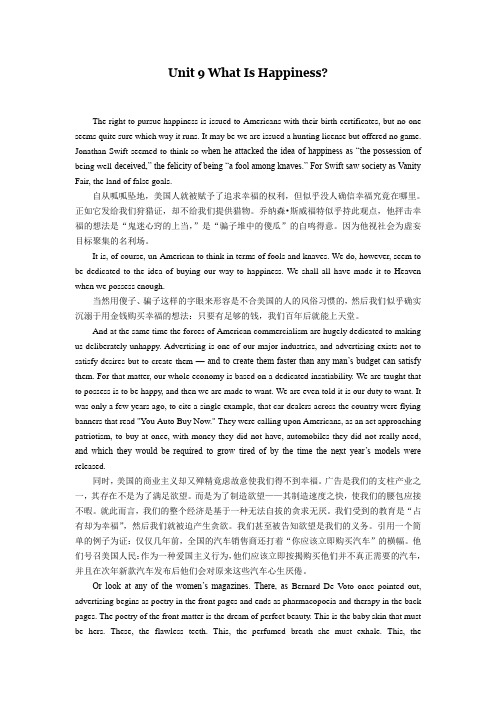
Unit 9 What Is Happiness?The right to pursue happiness is issued to Americans with their birth certificates, but no one seems quite sure which way it runs. It may be we are issued a hunting license but offered no game. Jonathan Swift seemed to think so w hen he attacked the idea of happiness as “the possession of being well-deceived,” the felicity of being “a fool among knaves.” For Swift saw society as Vanity Fair, the land of false goals.自从呱呱坠地,美国人就被赋予了追求幸福的权利,但似乎没人确信幸福究竟在哪里。
正如它发给我们狩猎证,却不给我们提供猎物。
乔纳森•斯威福特似乎持此观点,他抨击幸福的想法是“鬼迷心窍的上当,”是“骗子堆中的傻瓜”的自鸣得意。
因为他视社会为虚妄目标聚集的名利场。
It is, of course, un-American to think in terms of fools and knaves. We do, however, seem to be dedicated to the idea of buying our way to happiness. We shall all have made it to Heaven when we possess enough.当然用傻子、骗子这样的字眼来形容是不合美国的人的风俗习惯的,然后我们似乎确实沉溺于用金钱购买幸福的想法:只要有足够的钱,我们百年后就能上天堂。
综合英语二册课文翻译unit2-unit9

UNIT2同感是怎样表露的1霍普才九个月大,一见到另一个婴儿摔倒,泪水就涌了出来。
她爬到妈妈身边寻求安慰,就好像是她自己摔疼了。
15个月大的迈克尔去把自己的玩具熊拿来给正在大哭的朋友保罗;保罗不停地大哭的时候,迈克尔替保罗捡回他的安乐毯。
这些小小的表示同情和关爱的举动都是接受过记录同感行为训练的母亲们观察到的。
这项研究的结果表明,同感的根源可以追溯到人的婴儿期。
实际上,从出生的那天起,婴儿在听到其他婴儿哭闹的时候就会感到不安——有些人认为这种反应是同感的最初先兆。
2成长心理学家发现,甚至在充分意识到自己是独立于其他人而存在之前,婴儿就感受到了同情的苦恼。
甚至在出生后几个月,婴儿就会对周围人的烦躁不安做出反应,就好像他们自己的烦躁不安一样,看到别的孩子哭也跟着哭。
到了一岁左右,他们开始意识到痛苦不是他们的,而是别人的,可是他们对这样的事情似乎还是感到不知所措。
例如,在纽约大学的马丁·L.霍夫曼所做的一项研究中,一个一岁的孩子把自己的妈妈拉过来安慰哭闹的朋友,却忽视了同在一室的朋友的妈妈。
这样的困惑在其他一岁大的孩子身上也能看到,他们模仿别的孩子的痛苦,也许是为了更好地理解他们的感受。
例如,如果别的婴儿伤了手指,一个一岁大的孩子就会把自己的手指放进嘴里,看看自己是否也感觉到痛。
看到自己的妈妈哭,婴儿即使没有眼泪,也会擦拭自己的眼睛。
3这种所谓的运动神经模仿就是“同感”的原始字面含义,而“同感”这个词于20世纪20年代由美国心理学家E.B.铁钦纳首次使用。
铁钦纳的理论是:同感发自对他人痛苦的一种身体模仿;这种模仿继而在自身引起同样的心理感受。
他当时在寻找一个与同情有所区别的词;同情是针对他人的一般困境而发的,无须分担他人的任何感受。
4小孩两岁半左右就渐渐不再有运动神经模仿行为,那时他们会意识到别人的痛苦与自己的不同,会更有能力安慰别人。
下面是摘自一位母亲日记里的典型事例:5邻居家的婴儿哭了,珍妮走上前去,试图给他一些小甜饼。
UnitWhatIsHappiness答案综合教程二.doc
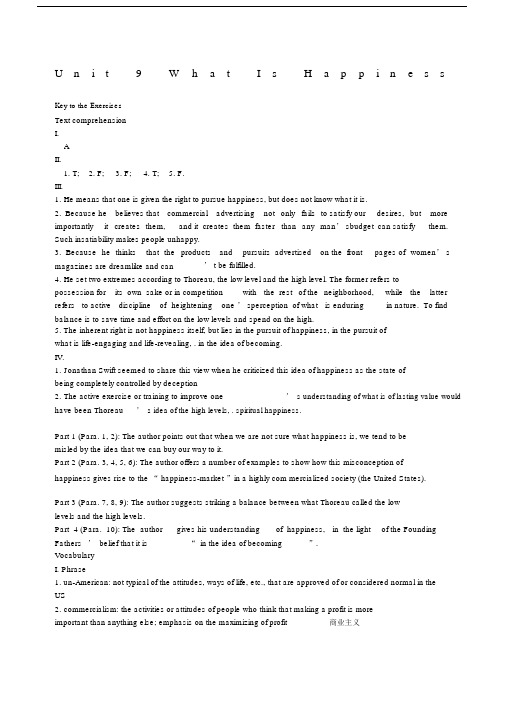
U n i t9W h a t I s H a p p i n e s sKey to the ExercisesText comprehensionI.AII.1. T;2. F;3. F;4. T;5. F.III.1. He means that one is given the right to pursue happiness, but does not know what it is.2. Because he believes that commercial advertising not only fails to satisfy our desires, but more importantly it creates them, and it creates them faster than any man’ sbudget can satisfy them. Such insatiability makes people unhappy.3. Because he thinks that the products and pursuits advertised on the front pages of women’ s magazines are dreamlike and can ’ t be fulfilled.4. He set two extremes according to Thoreau, the low level and the high level. The former refers topossession for its own sake or in competition with the rest of the neighborhood, while the latter refers to active discipline of heightening one ’ sperception of what is enduring in nature. To find balance is to save time and effort on the low levels and spend on the high.5.The inherent right is not happiness itself, but lies in the pursuit of happiness, in the pursuit ofwhat is life-engaging and life-revealing, . in the idea of becoming.IV.1.Jonathan Swift seemed to share this view when he criticized this idea of happiness as the state ofbeing completely controlled by deception2. The active exercise or training to improve one’ s understanding of what is of lasting value would have been Thoreau’ s idea of the high levels, . spiritual happiness.Part 1 (Para. 1, 2): The author points out that when we are not sure what happiness is, we tend to bemisled by the idea that we can buy our way to it.Part 2 (Para. 3, 4, 5, 6): The author offers a number of examples to show how this misconception ofhappiness gives rise to the “ happiness-market ”in a highly com mercialized society (the United States).Part 3 (Para. 7, 8, 9): The author suggests striking a balance between what Thoreau called the lowlevels and the high levels.Part 4 (Para. 10): The author gives his understanding of happiness, in the light of the Founding Fathers’ belief that it is“ in the idea of becoming”.VocabularyI. Phrase1.un-American: not typical of the attitudes, ways of life, etc., that are approved of or considered normal in theUSmercialism: the activities or attitudes of people who think that making a profit is moreimportant than anything else; emphasis on the maximizing of profit商业主义3. for that matter: it is also true that (The phrase “ for that matter ” is used to emphasize that though mentioned second, is also true, important, or relevant as what has been mentioned earlier.)就此而论,在这方面, 同样4. face: aspect 方面5. in nature: essentially 事实上,本质上II.1. perpetual;2. functions;3. inherent;4. cited;5. approaching;6. flawless;7. vaguely;8. disciplining.III. Word derivationFill in the blanks with the appropriate forms of the given words.1. pursuit2. deception3. dedication4. commercial5. patriotic6. fictional7. disapproval8. starvingIV.1. C;2. B;3. D;4. B;5. D;6. A;7. C;8. D.1.hugely — Synonym: enormously, tremendously;deliberately — Antonym: unintentionally, accidentally2.Synonym: perfect, spotless3.Antonym: inhale4.Antonym: impartial, unbiased5.Antonym: imbalance6.Synonym: have, own7.Synonym: fixed, stationary, quiet1. contain obtain2. concede precede3. compel repel4. suspend depend5. include conclude6. insist consist7. descend ascend8. evolve revolve1.yourself;2.You / We; you / we3.you / one / we4.it5.one another6.They / We7.myself8.yourself9.it10.I; We; They; us; They; it; weII.There; There; There; There; There;It; there; There; It; there.ThereIII.Replace the underlined parts in the following sentences with non-finite clauses or verbless clauses.1. While flattered,2. whether to go upstairs or to follow3. Whenever possible,4.if left untreated.5.if ready.6. Though no swimmer,7. Once over the pass,8. Whether by accident or by design,1.Once;2.Though;3.If;4.when;5.whether;6.Unless;7.Before;8.After.V.1. c;2. b;3. b;4. c;5. a;6. d;7. d;8. d.TranslationI.1. 广告是一项主要产业,它的存在与其说是为了满足人们的欲望;不如说是为了激发他们的欲望——而且是以超出任何人的收入所能承受的速度激发这些欲望。
Unit 9 What Is Happiness答案综合教程二
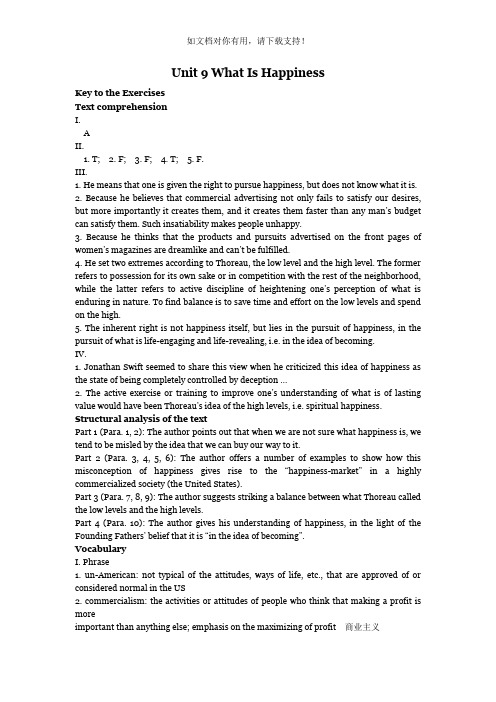
Unit 9 What Is HappinessKey to the ExercisesText comprehensionI.AII.1. T;2. F;3. F;4. T;5. F.III.1. He means that one is given the right to pursue happiness, but does not know what it is.2. Because he believes that commercial advertising not only fails to satisfy our desires, but more importantly it creates them, and it creates them faster than any man’s budget can satisfy them. Such insatiability makes people unhappy.3. Because he thinks that the products and pursuits advertised on the front pages of women’s magazines are dreamlike and can’t be fulfilled.4. He set two extremes according to Thoreau, the low level and the high level. The former refers to possession for its own sake or in competition with the rest of the neighborhood, whil e the latter refers to active discipline of heightening one’s perception of what is enduring in nature. To find balance is to save time and effort on the low levels and spend on the high.5. The inherent right is not happiness itself, but lies in the pursuit of happiness, in the pursuit of what is life-engaging and life-revealing, i.e. in the idea of becoming.IV.1. Jonathan Swift seemed to share this view when he criticized this idea of happiness as the state of being completely controlled by deception …2. The active exercise or training to improve one’s understanding of what is of lasting value would have been Thoreau’s idea of the high levels, i.e. spiritual happiness. Structural analysis of the textPart 1 (Para. 1, 2): The author points out that when we are not sure what happiness is, we tend to be misled by the idea that we can buy our way to it.Part 2 (Para. 3, 4, 5, 6): The author offers a number of examples to show how this misconception of happiness gives rise to the “happiness-market” in a highl y commercialized society (the United States).Part 3 (Para. 7, 8, 9): The author suggests striking a balance between what Thoreau called the low levels and the high levels.Part 4 (Para. 10): The author gives his understanding of happiness, in the light of the Founding Fathers’ belief that it is “in the idea of becoming”.VocabularyI. Phrase1. un-American: not typical of the attitudes, ways of life, etc., that are approved of or considered normal in the US2. commercialism: the activities or attitudes of people who think that making a profit is moreimportant than anything else; emphasis on the maximizing of profit 商业主义3. for that matter: it is also true that … (The phrase “for that matter” is used to emphasize that sth., though mentioned second, is also true, important, or relevant as what has been mentioned earlier.) 就此而论,在这方面, 同样4. face: aspect 方面5. in nature: essentially 事实上,本质上II.1. perpetual;2. functions;3. inherent;4. cited;5. approaching;6. flawless;7. vaguely;8. disciplining.III. Word derivationFill in the blanks with the appropriate forms of the given words.1. pursuit2. deception3. dedication4. commercial5. patriotic6. fictional7. disapproval8. starvingIV.1. C;2. B;3. D;4. B;5. D;6. A;7. C;8. D.V. Synonym / Antonym1. hugely — Synonym: enormously, tremendously;deliberately — Antonym: unintentionally, accidentally2. Synonym: perfect, spotless3. Antonym: inhale4. Antonym: impartial, unbiased5. Antonym: imbalance6. Synonym: have, own7. Synonym: fixed, stationary, quietVI. Prefix / SuffixWrite in each space one word that has the same stem as underlined in each given word.1. contain obtain2. concede precede3. compel repel4. suspend depend5. include conclude6. insist consist7. descend ascend8. evolve revolveGrammar ExercisesI. Complete the sentences below with suitable pronouns.1. yourself;2. You / We; you / we3. you / one / we4. it5. one another6. They / We7. myself8. yourself9. it10. I; We; They; us; They; it; weII.There; There; There; There; There;It; there; There; It; there.ThereIII. Replace the underlined parts in the following sentences with non-finite clauses or verbless clauses.1. While flattered, …2. … whether to go upstairs or to follow …3. Whenever possible, …4. … if left untreated.5. … if ready.6. Though no swimmer, …7. Once over the pass, …8. Whether by accident or by design, …IV.1. Once;2. Though;3. If;4. when;5. whether;6. Unless;7. Before;8. After.V.1. c;2. b;3. b;4. c;5. a;6. d;7. d;8. d.TranslationI.1. 广告是一项主要产业,它的存在与其说是为了满足人们的欲望;不如说是为了激发他们的欲望——而且是以超出任何人的收入所能承受的速度激发这些欲望。
Unit 9 What Is Happiness答案综合教程二
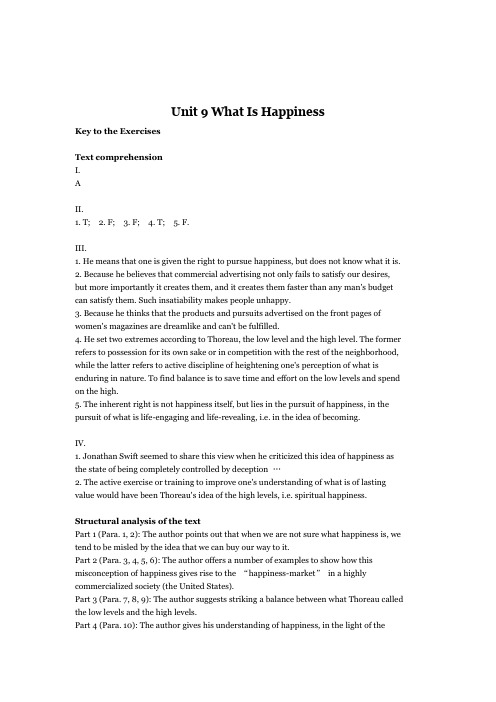
Unit 9 What Is HappinessKey to the ExercisesText comprehensionI.AII.1. T;2. F;3. F;4. T;5. F.III.1. He means that one is given the right to pursue happiness, but does not know what it is.2. Because he believes that commercial advertising not only fails to satisfy our desires, but more importantly it creates them, and it creates them faster than any man's budget can satisfy them. Such insatiability makes people unhappy.3. Because he thinks that the products and pursuits advertised on the front pages of women's magazines are dreamlike and can't be fulfilled.4. He set two extremes according to Thoreau, the low level and the high level. The former refers to possession for its own sake or in competition with the rest of the neighborhood, while the latter refers to active discipline of heightening one's perception of what is enduring in nature. To find balance is to save time and effort on the low levels and spend on the high.5. The inherent right is not happiness itself, but lies in the pursuit of happiness, in the pursuit of what is life-engaging and life-revealing, i.e. in the idea of becoming.IV.1. Jonathan Swift seemed to share this view when he criticized this idea of happiness as the state of being completely controlled by deception …2. The active exercise or training to improve one's understanding of what is of lasting value would have been Thoreau's idea of the high levels, i.e. spiritual happiness.Structural analysis of the textPart 1 (Para. 1, 2): The author points out that when we are not sure what happiness is, we tend to be misled by the idea that we can buy our way to it.Part 2 (Para. 3, 4, 5, 6): The author offers a number of examples to show how this misconception of happiness gives rise to the “happiness-market”in a highly commercialized society (the United States).Part 3 (Para. 7, 8, 9): The author suggests striking a balance between what Thoreau called the low levels and the high levels.Part 4 (Para. 10): The author gives his understanding of happiness, in the light of theFounding Fathers' belief that it is “in the idea of becoming”.VocabularyI. Phrase1. un-American: not typical of the attitudes, ways of life, etc., that are approved of or considered normal in the US2. commercialism: the activities or attitudes of people who think that making a profit ismoreimportant than anything else; emphasis on the maximizing of profit 商业主义3. for that matter: it is also true that …(The phrase “for that matter”is used to emphasize that sth., though mentioned second, is also true, important, or relevant as what has been mentioned earlier.) 就此而论,在这方面, 同样4. face: aspect 方面5. in nature: essentially 事实上,本质上II.1. perpetual;2. functions;3. inherent;4. cited;5. approaching;6. flawless;7. vaguely;8. disciplining.III. Word derivationFill in the blanks with the appropriate forms of the given words.1. pursuit2. deception3. dedication4. commercial5. patriotic6. fictional7. disapproval8. starvingIV.1. C;2. B;3. D;4. B;5. D;6. A;7. C;8. D.V. Synonym / Antonym1. hugely —Synonym: enormously, tremendously;deliberately —Antonym: unintentionally, accidentally2. Synonym: perfect, spotless3. Antonym: inhale4. Antonym: impartial, unbiased5. Antonym: imbalance6. Synonym: have, own7. Synonym: fixed, stationary, quietVI. Prefix / SuffixWrite in each space one word that has the same stem as underlined in each given word.1. contain obtain2. concede precede3. compel repel4. suspend depend5. include conclude6. insist consistascend 7. descend8. evolve revolveGrammar ExercisesI. Complete the sentences below with suitable pronouns.1. yourself;2. You / We; you / we3. you / one / we4. it5. one another6. They / We7. myself8. yourself9. it10. I; We; They; us; They; it; weII.There; There; There; There; There;It; there; There; It; there.ThereIII. Replace the underlined parts in the following sentences with non-finite clauses or verbless clauses.1. While flattered, …2. …whether to go upstairs or to follow …3. Whenever possible, …4. …if left untreated.5. …if ready.6. Though no swimmer, …7. Once over the pass, …8. Whether by accident or by design, …IV.1. Once;2. Though;3. If;4. when;5. whether;6. Unless;7. Before;8. After.V.1. c;2. b;3. b;4. c;8. d.7. d; 6. d; 5. a;TranslationI.1. 广告是一项主要产业,它的存在与其说是为了满足人们的欲望;不如说是为了激发他们的欲望——而且是以超出任何人的收入所能承受的速度激发这些欲望。
英语专业综合教程2Unit9what is happiness
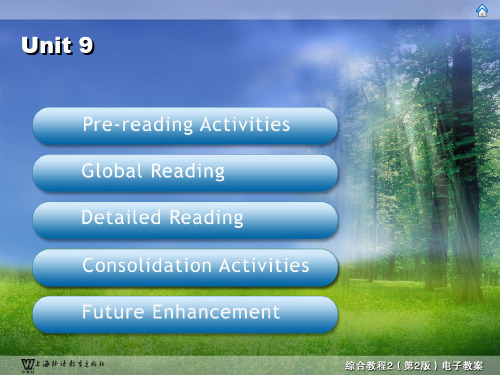
Text analysis
Structural analysis
2. What‘s the author‘s purpose of writing? To attempt a definition of happiness by setting some extremes to the idea and then working in toward the middle.
3-7
Main idea
Structural analysis
Paragraphs
8-9
Main idea The author suggests striking a balance between what Thoreau called the low levels and the high levels.
Unit 9
Audiovisual supplement
Cultural information
Watch the video and answer the following questions. 1. What happened to Chris? It was the last day of Chris‘ internship at a prestigious stock brokerage firm. At last he got the job as a broker. This could change his life. So after meeting the managers, Chris got his happiness. 2. Do you have the experience that you struggled so hard to achieve something, and at last you made it? Open.
Unit 9 What is happiness课文翻译综合教程二

Unit 9 What is happiness课文翻译综合教程二嗨,伙计们!今天我们来聊聊一个让人们心驰神往的话题——幸福。
幸福是什么?这个问题可难倒了不少人。
有人说幸福就是拥有一份高薪工作,有人说幸福就是拥有一个美满的家庭,还有人说幸福就是拥有健康的身体。
到底什么是真正的幸福呢?让我们来看看第一个小节。
1.1 幸福的定义。
幸福这个词儿听起来就很美好,让人想起了阳光、沙滩和冰淇淋。
幸福到底是什么呢?其实,幸福就是一个感觉,一种让你感到满足、快乐和安心的感觉。
这种感觉可能来自于你的工作、家庭、朋友或者爱好。
幸福是一个非常主观的概念,每个人都有自己的幸福标准。
我们来看看第二个小节。
2.1 幸福与金钱的关系。
有些人认为,只要有钱,就能买到幸福。
可是,事实真的是这样吗?让我们来举个例子吧。
有一个人,他拥有了全世界所有的财富,但是他却感到非常孤独和空虚。
因为他发现,金钱买不到真正的友谊和爱情。
金钱虽然重要,但它并不是幸福的全部。
现在,我们来到了第三个小节。
3.1 幸福的来源。
幸福到底来自哪里呢?其实,幸福来自于我们内心的满足感。
当我们对自己的生活感到满意时,我们就会感到幸福。
而这种满足感往往来自于我们的工作、家庭和朋友。
比如说,当你在工作中取得了成就感,当你和家人朋友共度美好时光时,你就会感到幸福。
我们来看看第四个小节。
3.2 如何追求幸福。
如何才能追求到幸福呢?我们要明确自己的幸福标准。
每个人都有自己的梦想和期望,只有明确了自己想要的东西,才能更好地去追求。
我们要努力实现自己的目标。
没有付出就没有收获,只有通过努力工作,才能让自己的生活更加美好。
我们要学会珍惜眼前的幸福。
有时候,我们总是把目光放在远方,却忽略了身边的美好。
我们要学会感恩,珍惜当下的每一刻。
幸福是一个非常主观的概念,每个人都有自己的幸福标准。
金钱虽然重要,但它并不是幸福的全部。
真正的幸福来自于我们内心的满足感,来自于我们的工作、家庭和朋友。
最新Unit-9-What-is-happiness课文翻译综合教程二资料
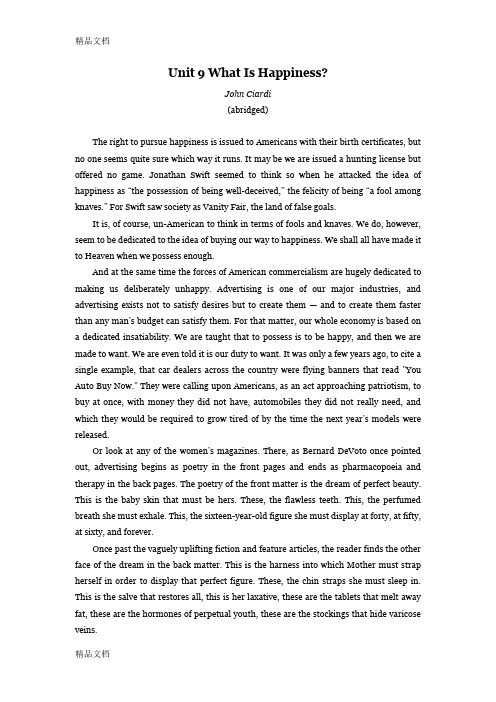
Unit 9 What Is Happiness?John Ciardi(abridged)The right to pursue happiness is issued to Americans with their birth certificates, but no one seems quite sure which way it runs. It may be we are issued a hunting license but offered no game. Jonathan Swift seemed to think so when he attacked the idea of happiness as “the possession of being well-deceived,” the felicity of being “a fool among knaves.” For Swift saw society as Vanity Fair, the land of false goals.It is, of course, un-American to think in terms of fools and knaves. We do, however, seem to be dedicated to the idea of buying our way to happiness. We shall all have made it to Heaven when we possess enough.And at the same time the forces of American commercialism are hugely dedicated to making us deliberately unhappy. Advertising is one of our major industries, and advertising exists not to satisfy desires but to create them —and to create them faster than any man’s budget can satisfy them. For that matter, our whole economy is base d on a dedicated insatiability. We are taught that to possess is to be happy, and then we are made to want. We are even told it is our duty to want. It was only a few years ago, to cite a single example, that car dealers across the country were flying banners that read "You Auto Buy Now." They were calling upon Americans, as an act approaching patriotism, to buy at once, with money they did not have, automobiles they did not really need, and which they would be required to grow tired of by the time the next year’s models were released.Or look at any of the women’s magazines. There, as Bernard DeVoto once pointed out, advertising begins as poetry in the front pages and ends as pharmacopoeia and therapy in the back pages. The poetry of the front matter is the dream of perfect beauty. This is the baby skin that must be hers. These, the flawless teeth. This, the perfumed breath she must exhale. This, the sixteen-year-old figure she must display at forty, at fifty, at sixty, and forever.Once past the vaguely uplifting fiction and feature articles, the reader finds the other face of the dream in the back matter. This is the harness into which Mother must strap herself in order to display that perfect figure. These, the chin straps she must sleep in. This is the salve that restores all, this is her laxative, these are the tablets that melt away fat, these are the hormones of perpetual youth, these are the stockings that hide varicose veins.Obviously no half-sane person can be completely persuaded either by such poetry or by such pharmacopoeia and orthopedics. Yet someone is obviously trying to buy the dream as offered and spending billions every year in the attempt. Clearly the happiness-market is not running out of customers, but what are they trying to buy?The idea "happiness," to be sure, will not sit still for easy definitions: the best one can do is to try to set some extremes to the idea and then work in toward the middle. To think of happiness as acquisitive and competitive will do to set the materialistic extreme. To think of it as the idea one senses in, say, a holy man of India will do to set the spiritual extreme. That holy man’s ideal of happiness is in needing nothing from outside himself. In wanting nothing, he lacks nothing. He sits immobile, rapt in contemplation, free even of his own body.7 Or nearly free of it. If devout admirers bring him food, he eats it; if not, he starves indifferently. Why be concerned? What is physical is an illusion to him. Contemplation is his joy and he achieves it through a fantastically demanding discipline, the accomplishment of which is itself a joy within him.But, perhaps because I am Western, I doubt such catatonic happiness, as I doubt the dreams of the happiness-market. What is certain is that his way of happiness would be torture to almost any Western man. Yet these extremes will still serve to frame the area within which all of us must find some sort of balance. Thoreau —a creature of both Eastern and Western thought — had his own firm sense of that balance. His aim was to save on the low levels in order to spend on the high.Possession for its own sake or in competition with the rest of the neighborhood would have been Thoreau’s idea of the low levels. The active discipline of heightening o ne’s perception of what is enduring in nature would have been his idea of the high.10 What he saved from the low was time and effort he could spend on the high. Thoreau certainly disapproved of starvation, but he would put into feeding himself only as much effort as would keep him functioning for more important efforts.Happiness is never more than partial. There are no pure states of mankind. Whatever else happiness may be, it is neither in having nor in being, but in becoming. What the Founding Fathers declared for us as an inherent right, we should do well to remember, was not happiness but the pursuit of happiness. What they might have underlined, could they have foreseen the happiness-market, is the cardinal fact that happiness is in the pursuit itself, in the meaningful pursuit of what is life-engaging and life-revealing, which is to say, in the idea of becoming. A nation is not measured by what it possesses or wants to possess, but by what it wants to become.什么是幸福追求幸福是美国人与生俱来被赋予的权利,但是似乎没有人确切地知道怎样到达幸福。
英语专业综合教程2Unit9what is happiness

10
The author gives his understanding of happiness, in the light of the Founding Fathers‘ belief that it is ―in the idea of becoming‖.
Detailed reading
Detailed reading
We are taught that to possess is to be happy, and then we are made to want. We are even told it is our duty to want. It was only a few years ago, to cite a single example, that car dealers across the country were flying banners that read ―You Auto Buy Now.‖ They were calling upon Americans, as an act approaching patriotism, to buy at once, with money they did not have, automobiles they did not really need, and which they would be required to grow tired of by the time the next year‘s models were released.
Audiovisual supplement
Cultural information
Chris: Yes, sir. Mr. Frohm: Good. We couldn‘t be happier. So welcome. Was it as easy as it looked? Chris: No, sir. No, sir, it wasn‘t. Mr. Frohm: Good luck, Chris. Chris: Thank you. Thank you. Mr. Frohm: Oh, Chris. I almost forgot. Chris: Thank you. Voiceover: This part of my life ... this little part ... is called ―happiness.‖
大学英语综合教程2unit9 what is happiness 译文
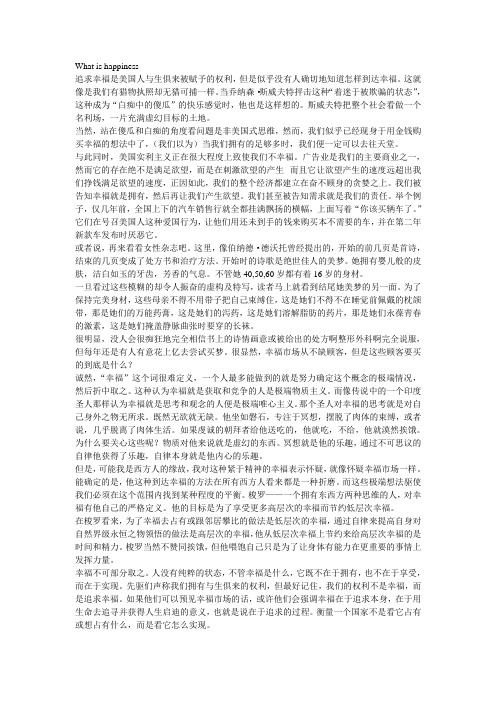
What is happiness追求幸福是美国人与生俱来被赋予的权利,但是似乎没有人确切地知道怎样到达幸福。
这就像是我们有猎物执照却无猎可捕一样。
当乔纳森·斯威夫特抨击这种“着迷于被欺骗的状态”,这种成为“白痴中的傻瓜”的快乐感觉时,他也是这样想的。
斯威夫特把整个社会看做一个名利场,一片充满虚幻目标的土地。
当然,站在傻瓜和白痴的角度看问题是非美国式思维,然而,我们似乎已经现身于用金钱购买幸福的想法中了,(我们以为)当我们拥有的足够多时,我们便一定可以去往天堂。
与此同时,美国实利主义正在很大程度上致使我们不幸福。
广告业是我们的主要商业之一,然而它的存在绝不是满足欲望,而是在刺激欲望的产生--而且它让欲望产生的速度远超出我们挣钱满足欲望的速度,正因如此,我们的整个经济都建立在奋不顾身的贪婪之上。
我们被告知幸福就是拥有,然后再让我们产生欲望。
我们甚至被告知需求就是我们的责任。
举个例子,仅几年前,全国上下的汽车销售行就全都挂满飘扬的横幅,上面写着“你该买辆车了。
”它们在号召美国人这种爱国行为,让他们用还未到手的钱来购买本不需要的车,并在第二年新款车发布时厌恶它。
或者说,再来看看女性杂志吧。
这里,像伯纳德·德沃托曾经提出的,开始的前几页是首诗,结束的几页变成了处方书和治疗方法。
开始时的诗歌是绝世佳人的美梦。
她拥有婴儿般的皮肤,洁白如玉的牙齿,芳香的气息。
不管她40,50,60岁都有着16岁的身材。
一旦看过这些模糊的却令人振奋的虚构及特写,读者马上就看到结尾她美梦的另一面。
为了保持完美身材,这些母亲不得不用带子把自己束缚住,这是她们不得不在睡觉前佩戴的枕颌带,那是她们的万能药膏,这是她们的泻药,这是她们溶解脂肪的药片,那是她们永葆青春的激素,这是她们掩盖静脉曲张时要穿的长袜。
很明显,没人会很痴狂地完全相信书上的诗情画意或被给出的处方啊整形外科啊完全说服,但每年还是有人有意花上亿去尝试买梦。
英语专业综合教程2Unit9what is happiness

Text analysis
Structural analysis
2. What‘s the author‘s purpose of writing? To attempt a definition of happiness by setting some extremes to the idea and then working in toward the middle.
Audiovisual supplement
Cultural information
1. Quote
Happiness lies not in the mere possession of money; it lies in the joy of achievement, in the thrill of creative effort. — Franklin Roosevelt
Audiovisual supplement
Cultural information
2. The Pursuit of Happiness
The Pursuit of Happiness is a 2006 American biographical film directed by Gabriele Muccino about the on-and-offhomeless salesman-turned stockbroker Chris Gardner. The screenplay by Steven Conrad is based on the best-selling memoir of the same name written by Chris Gardner with Quincy Troupe. The film was released on December 15, 2006, by Columbia Pictures.
Unit 9 What Is Happiness 综合教程二

Detailed reading
2 It is, of course, un-American to think in terms of fools and knaves. We do, however, seem to be dedicated to the idea of buying our way to happiness. We shall all have made it to Heaven when we possess enough. 3 And at the same time the forces of American commercialism are hugely dedicated to making us deliberately unhappy. Advertising is one of our major industries, and advertising exists not to satisfy desires but to create them — and to create them faster than any man‘s budget can satisfy them. For that matter, our whole economy is based on a dedicated insatiability.
Unit 9 What Is Happiness?
Audiovisual supplement
Cultural information
Watch the video and answer the following questions. 1. What happened to Chris? It was the last day of Chris‘ internship at a prestigious stock brokerage firm. At last he got the job as a broker. This could change his life. So after meeting the managers, Chris got his happiness. 2. Do you have the experience that you struggled so hard to achieve something, and at last you made it? Open.
综合教程IIUnit 9 What Is Happiness课后练习参考答案

house.
A. superb
❀ B. fantastic C. whole D. incomplete
6. A White House spokesperson declared that there would
be no change in the Administration’s policy on Iraq.
e.g. Your mother would never allow it, and for that matter, neither would I. 你母亲决不会允许,就这一点来说,我也不会允许。
For that matter she would drive herself and keep the whole event within her control. 同样,她宁愿自己开车,将整个事情置于自己的控制 中。
flawless perpetual
5. We heard the rumble of a tank engine ___a_p_p_r_o_a_c_h_in__g___ from behind.
6. As a violinist his technique was __f_la__w_le__s_s___ but somehow he lacked passion.
face: aspect 方面
e.g. The unacceptable face of this house is that it is too expensive. 这个房子不可接受的方面是它的价格太高了。
in nature: essentially 事实上,本质上
e.g. This rule is scientific in nature. 这个法则在本质上是科学的。
复习精华 - 大学英语《综合教程2》Unit9
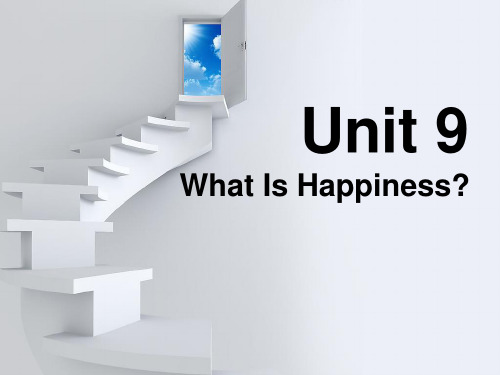
exhale vt. / vi. breathe air out through your mouth or nose Ex. Hold your breath for five seconds and then exhale slowly. He exhaled smoke hurriedly to continue his urgent work. opp: inhale display vt. to give a clear demonstration of (a quality, emotion, or skill) Ex. The new market displayed a great many goods for sale. display n. syn: present, demonstrate
Disciplinary a.
惩戒性的;执行纪律的
Perception n. the ability to realize or notice things
洞察力;认识能力 Ex. There is a perception that management only wants to cut costs. She has extraordinary powers of perception for one so young.
Partiality n. partially a.
syn: prejudiced, biased opp:
impartial
Declare vt. announce officially that sth. is true or happening
Ex. The president’s budget message declared that the new economic program was working well. declare war on / against sb.
Unit 9 What Is Happiness答案综合教程二

Unit 9 What Is HappinessKey to the ExercisesText comprehensionI.AII.1. T;2. F;3. F;4. T;5. F.III.1. He means that one is given the right to pursue happiness, but does not know what it is.2. Because he believes that commercial advertising not only fails to satisfy our desires, but more importantly it creates them, and it creates them faster than any man’s budget can satisfy them. Such insatiability makes people unhappy.3. Because he thinks that the products and pursuits advertised on the front pages of women’s magazines are dreamlike and can’t be fulfilled.4. He set two extremes according to Thoreau, the low level and the high level. The former refers to possession for its own sake or in competition with the rest of the neighborhood, whil e the latter refers to active discipline of heightening one’s perception of what is enduring in nature. To find balance is to save time and effort on the low levels and spend on the high.5. The inherent right is not happiness itself, but lies in the pursuit of happiness, in the pursuit of what is life-engaging and life-revealing, i.e. in the idea of becoming.IV.1. Jonathan Swift seemed to share this view when he criticized this idea of happiness as the state of being completely controlled by deception …2. The active exercise or training to improve one’s understanding of what is of lasting value would have been Thoreau’s idea of the high levels, i.e. spiritual happiness. Structural analysis of the textPart 1 (Para. 1, 2): The author points out that when we are not sure what happiness is, we tend to be misled by the idea that we can buy our way to it.Part 2 (Para. 3, 4, 5, 6): The author offers a number of examples to show how this misconception of happiness gives rise to the “happiness-market” in a highl y commercialized society (the United States).Part 3 (Para. 7, 8, 9): The author suggests striking a balance between what Thoreau called the low levels and the high levels.Part 4 (Para. 10): The author gives his understanding of happiness, in the light of the Founding Fathers’ belief that it is “in the idea of becoming”.VocabularyI. Phrase1. un-American: not typical of the attitudes, ways of life, etc., that are approved of or considered normal in the US2. commercialism: the activities or attitudes of people who think that making a profit is moreimportant than anything else; emphasis on the maximizing of profit 商业主义3. for that matter: it is also true that … (The phrase “for that matter” is used to emphasize that sth., though mentioned second, is also true, important, or relevant as what has been mentioned earlier.) 就此而论,在这方面, 同样4. face: aspect 方面5. in nature: essentially 事实上,本质上II.1. perpetual;2. functions;3. inherent;4. cited;5. approaching;6. flawless;7. vaguely;8. disciplining.III. Word derivationFill in the blanks with the appropriate forms of the given words.1. pursuit2. deception3. dedication4. commercial5. patriotic6. fictional7. disapproval8. starvingIV.1. C;2. B;3. D;4. B;5. D;6. A;7. C;8. D.V. Synonym / Antonym1. hugely — Synonym: enormously, tremendously;deliberately — Antonym: unintentionally, accidentally2. Synonym: perfect, spotless3. Antonym: inhale4. Antonym: impartial, unbiased5. Antonym: imbalance6. Synonym: have, own7. Synonym: fixed, stationary, quietVI. Prefix / SuffixWrite in each space one word that has the same stem as underlined in each given word.1. contain obtain2. concede precede3. compel repel4. suspend depend5. include conclude6. insist consist7. descend ascend8. evolve revolveGrammar ExercisesI. Complete the sentences below with suitable pronouns.1. yourself;2. You / We; you / we3. you / one / we4. it5. one another6. They / We7. myself8. yourself9. it10. I; We; They; us; They; it; weII.There; There; There; There; There;It; there; There; It; there.ThereIII. Replace the underlined parts in the following sentences with non-finite clauses or verbless clauses.1. While flattered, …2. … whether to go upstairs or to follow …3. Whenever possible, …4. … if left untreated.5. … if ready.6. Though no swimmer, …7. Once over the pass, …8. Whether by accident or by design, …IV.1. Once;2. Though;3. If;4. when;5. whether;6. Unless;7. Before;8. After.V.1. c;2. b;3. b;4. c;5. a;6. d;7. d;8. d.TranslationI.1. 广告是一项主要产业,它的存在与其说是为了满足人们的欲望;不如说是为了激发他们的欲望——而且是以超出任何人的收入所能承受的速度激发这些欲望。
英语专业综合教程2Unit9what is happiness

Audiovisual supplement
Cultural information
Chris: Yes, sir. Mr. Frohm: Good. We couldn‘t be happier. So welcome. Was it as easy as it looked? Chris: No, sir. No, sir, it wasn‘t. Mr. Frohm: Good luck, Chris. Chris: Thank you. Thank you. Mr. Frohm: Oh, Chris. I almost forgot. Chris: Thank you. Voiceover: This part of my life ... this little part ... is called ―happiness.‖
Audiovisual supplement
Cultural information
Chris Gardner is a bright and talented, but marginally employed salesman. Struggling to make ends meet, Gardner finds himself and his five-year-old son evicted from their San Francisco apartment with nowhere to go. When Gardner lands an internship at a prestigious stock brokerage firm, he and his son endure many hardships, including living in shelters, in pursuit of his dream of a better life for the two of them.
- 1、下载文档前请自行甄别文档内容的完整性,平台不提供额外的编辑、内容补充、找答案等附加服务。
- 2、"仅部分预览"的文档,不可在线预览部分如存在完整性等问题,可反馈申请退款(可完整预览的文档不适用该条件!)。
- 3、如文档侵犯您的权益,请联系客服反馈,我们会尽快为您处理(人工客服工作时间:9:00-18:30)。
Unit 9 What Is Happiness?John Ciardi(abridged)The right to pursue happiness is issued to Americans with their birth certificates, but no one seems quite sure which way it runs. It may be we are issued a hunting license but offered no game. Jonathan Swift seemed to think so when he attacked the idea of happiness as “the possession of being well-deceived,” the felicity of being “a fool among knaves.” For Swift saw society as Vanity Fair, the land of false goals.It is, of course, un-American to think in terms of fools and knaves. We do, however, seem to be dedicated to the idea of buying our way to happiness. We shall all have made it to Heaven when we possess enough.And at the same time the forces of American commercialism are hugely dedicated to making us deliberately unhappy. Advertising is one of our major industries, and advertising exists not to satisfy desires but to create them —and to create them faster than any man’s budget can satisfy them. For that matter, our whole economy is base d on a dedicated insatiability. We are taught that to possess is to be happy, and then we are made to want. We are even told it is our duty to want. It was only a few years ago, to cite a single example, that car dealers across the country were flying banners that read "You Auto Buy Now." They were calling upon Americans, as an act approaching patriotism, to buy at once, with money they did not have, automobiles they did not really need, and which they would be required to grow tired of by the time the next year’s models were released.Or look at any of the women’s magazines. There, as Bernard DeVoto once pointed out, advertising begins as poetry in the front pages and ends as pharmacopoeia and therapy in the back pages. The poetry of the front matter is the dream of perfect beauty. This is the baby skin that must be hers. These, the flawless teeth. This, the perfumed breath she must exhale. This, the sixteen-year-old figure she must display at forty, at fifty, at sixty, and forever.Once past the vaguely uplifting fiction and feature articles, the reader finds the other face of the dream in the back matter. This is the harness into which Mother must strap herself in order to display that perfect figure. These, the chin straps she must sleep in. This is the salve that restores all, this is her laxative, these are the tablets that melt away fat, these are the hormones of perpetual youth, these are the stockings that hide varicose veins.Obviously no half-sane person can be completely persuaded either by such poetry or by such pharmacopoeia and orthopedics. Yet someone is obviously trying to buy the dream as offered and spending billions every year in the attempt. Clearly the happiness-market is not running out of customers, but what are they trying to buy?The idea "happiness," to be sure, will not sit still for easy definitions: the best one can do is to try to set some extremes to the idea and then work in toward the middle. To think of happiness as acquisitive and competitive will do to set the materialistic extreme. To think of it as the idea one senses in, say, a holy man of India will do to set the spiritual extreme. That holy man’s ideal of happiness is in needing nothing from outside himself. In wanting nothing, he lacks nothing. He sits immobile, rapt in contemplation, free even of his own body.7 Or nearly free of it. If devout admirers bring him food, he eats it; if not, he starves indifferently. Why be concerned? What is physical is an illusion to him. Contemplation is his joy and he achieves it through a fantastically demanding discipline, the accomplishment of which is itself a joy within him.But, perhaps because I am Western, I doubt such catatonic happiness, as I doubt the dreams of the happiness-market. What is certain is that his way of happiness would be torture to almost any Western man. Yet these extremes will still serve to frame the area within which all of us must find some sort of balance. Thoreau —a creature of both Eastern and Western thought — had his own firm sense of that balance. His aim was to save on the low levels in order to spend on the high.Possession for its own sake or in competition with the rest of the neighborhood would have been Thoreau’s idea of the low levels. The active discipline of heightening o ne’s perception of what is enduring in nature would have been his idea of the high.10 What he saved from the low was time and effort he could spend on the high. Thoreau certainly disapproved of starvation, but he would put into feeding himself only as much effort as would keep him functioning for more important efforts.Happiness is never more than partial. There are no pure states of mankind. Whatever else happiness may be, it is neither in having nor in being, but in becoming. What the Founding Fathers declared for us as an inherent right, we should do well to remember, was not happiness but the pursuit of happiness. What they might have underlined, could they have foreseen the happiness-market, is the cardinal fact that happiness is in the pursuit itself, in the meaningful pursuit of what is life-engaging and life-revealing, which is to say, in the idea of becoming. A nation is not measured by what it possesses or wants to possess, but by what it wants to become.什么是幸福追求幸福是美国人与生俱来被赋予的权利,但是似乎没有人确切地知道怎样到达幸福。
